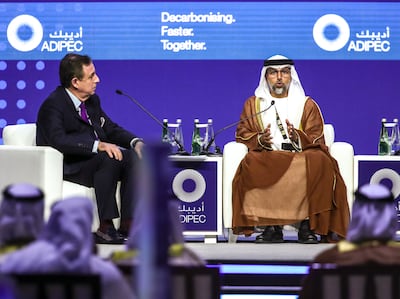The oil and gas industry is essential to solving current global energy challenges, including playing a “critical” role in scaling up renewable energy, Cop28 President-designate Dr Sultan Al Jaber has said.
Speaking at Adipec on Monday, Dr Al Jaber, who is also the managing director and group chief executive of Adnoc, said that “everyone must be at the table to make the transformational progress needed”.
“I firmly believe that just as this industry has enabled human prosperity in the past, it will be essential to solving the global challenges we all face today,” he said.
“No other industry has the same ability to manage [the] complexity, depth of knowledge, capital, technology and scale that is needed for the task at hand.”
Dr Al Jaber said global economies currently run on the equivalent of 250 million barrels of oil, gas, and coal every day, which either needs to be replaced or decarbonised.
“This industry can and must help to drive the solutions. For too long, this industry has been viewed as part of the problem, that it is not doing enough and, in some cases, even blocking progress,” he said.
This year’s energy conference comes weeks before the start of the Cop28 summit in November, where countries will assess where they stand with regards to climate goals as part of a process called the global stock take.
The adoption of renewable energy has gathered pace since Russia’s invasion of Ukraine last year, which disrupted global oil and gas markets and pushed Brent crude, the benchmark for two thirds of the world’s oil, to about $140 a barrel.
Investment in clean energy is set to hit $1.7 trillion this year, outpacing spending on fossil fuels, as countries look to address potential energy shortages, according to the International Energy Agency.
Global energy investment is projected to reach $2.8 trillion in 2023, with more than 60 per cent allocated to clean sources and technology, including renewables, electric vehicles, nuclear power and heat pumps, the Paris-based agency said in its World Energy Investment report in May.
“The world must reduce emissions by at least 43 per cent over the next seven years to keep 1.5°C within reach. And that is our north star. It is our destination. It is simply respecting the science,” said Dr Al Jaber, who's also the UAE Minister of Industry and Advanced Technology.
“And we must do this while also ensuring human prosperity by meeting the energy needs of the planet’s growing population.”
He also said the Cop28 presidency was prioritising areas such as curbing emissions from the production of energy, scaling up renewables and decarbonising hard-to-abate sectors such as steel cement, aluminium and heavy transport.

Suhail Al Mazrouei, Minister of Energy and Infrastructure, said during an Adipec panel session on Monday that the UAE would be “even more aggressive” in striving to hit its renewable energy goals, but would not ignore its responsibility as a supplier of crude oil to global consumers.
Adnoc has brought forward its goal to achieve 5 million barrels per day of production to 2027, from 2030, to address the underinvestment in the oil and gas sector, he said.
“We believe [that] even that may not be enough. It's not a secret that within Opec+ we lost 4 million barrels in just three years because of lack of investment,” he said.
Opec secretary general Haitham Al Ghais, who was also speaking at the same panel, said the oil producer's group was optimistic on crude demand but warned that underinvestment posed a big risk to energy security.
The oil and gas industry will require $14 trillion, or $600 billion a year, in investment from now until 2045 to ensure energy security, he said.
“Everybody thinks [it] is just investing in producing oil, but you also have to see the whole value chain,” Mr Al Ghais said.
